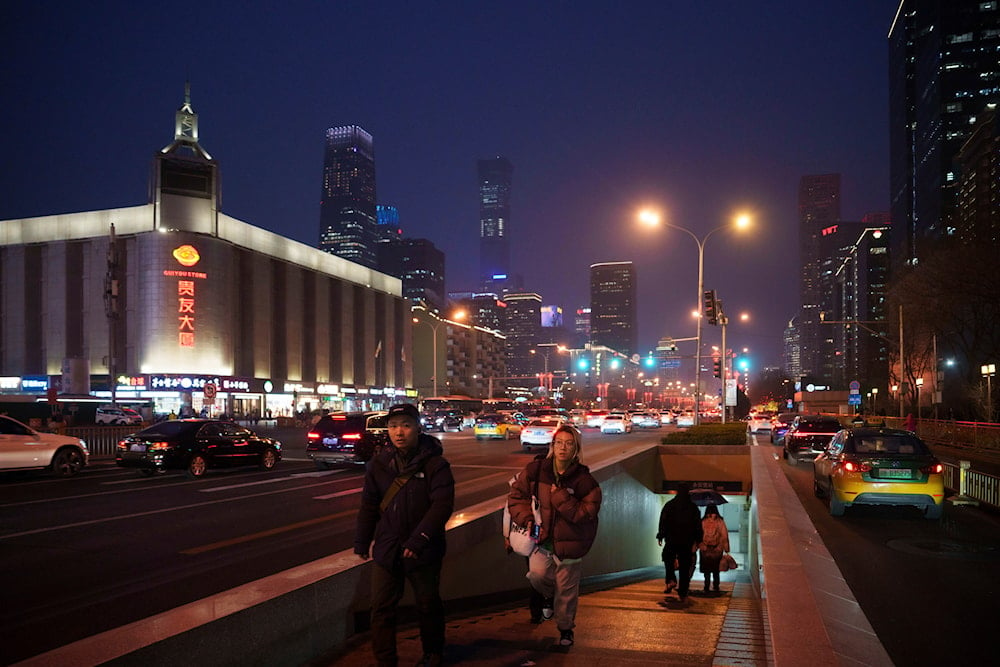China retaliates against Canada with new agricultural tariffs
The new levies, which take effect on March 20, match Canada’s 100% and 25% import duties imposed last year on Chinese electric vehicles, steel, and aluminum products.
-

Pedestrians exit an underground tunnel in downtown Beijing, China, on Friday, March 7, 2025. (AP)
China has announced tariffs on more than $2.6 billion worth of Canadian agricultural and food products, retaliating against trade restrictions Ottawa imposed in October. The move intensifies tensions in an ongoing trade dispute, largely fueled by US President Donald Trump's tariff policies.
The Chinese Commerce Ministry stated on Saturday that the tariffs, set to take effect on March 20, will mirror Canada's 100% and 25% import duties on Chinese electric vehicles, steel, and aluminum. However, Beijing notably excluded canola—a key Canadian export—possibly signaling openness to future negotiations.
According to analysts, the tariffs serve as both economic retaliation and a strategic warning, particularly as the Trump administration considers easing its own 25% import levies on Canada and Mexico. Washington has warned that relief could be contingent on whether they implement a similar 20% duty Trump has imposed on Chinese imports, using fentanyl-related concerns as an excuse.
"Canada's measures seriously violate World Trade Organization rules, constitute a typical act of protectionism and are discriminatory measures that severely harm China's legitimate rights and interests," the Chinese Commerce Ministry said.
A calculated response to Canadian tariffs
The new tariffs include a 100% duty on over $1 billion worth of Canadian rapeseed oil, oil cakes, and pea imports, along with a 25% levy on $1.6 billion worth of pork and aquatic products.
Dan Wang, China director at Eurasia Group, described the move as a calculated warning to Canada. "By striking now, China reminds Canada of the cost of aligning too closely with American trade policy," she said, adding that "China's delayed response (to Ottawa's October tariffs) likely reflects both capacity constraints and strategic signalling." With Beijing also managing trade disputes with the US and EU, she noted, "Canada, a lower priority, had to wait its turn."
Canadian Prime Minister Justin Trudeau justified Ottawa's initial levies in August, arguing they were necessary to counter China’s state-driven industrial overcapacity. Canada’s decision aligned with similar import duties imposed by the US and the EU on Chinese-made electric vehicles.
In response, China launched an anti-dumping investigation into Canadian canola imports in September. The trade in canola, which accounted for over half of Canada’s total canola exports, was valued at $3.7 billion in 2023, according to the Canola Council of Canada.
JCI analyst Rosa Wang noted that Beijing's decision to exclude canola from the tariff list "might also be a gesture to leave room for negotiations."
Beijing may also be factoring in political dynamics, with Canada’s next national election due by October 20. "I expect Beijing will use the election and change of leader as an opportunity to reset relations as they did with Australia," said Even Pay, an agriculture analyst at Trivium China.
China previously imposed sweeping trade restrictions on Australian exports in 2020 after Canberra called for an investigation into the origins of COVID-19. The restrictions were only lifted in 2023, following a change in Australia’s leadership. Observers suggest Beijing could adopt a similar approach with Canada, waiting to reassess relations based on the outcome of its upcoming election.
Read next: How the trade war could expand beyond tariffs: WaPo

 3 Min Read
3 Min Read








